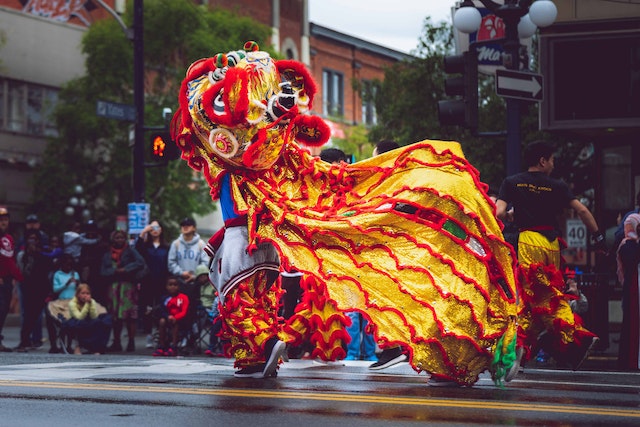Key Words in Mandarin for Beginners
Learning a new language can be intimidating, especially when it’s as different from English as Mandarin. The characters and the seemingly endless vocabulary (not to mention Chinese tones!) can make anyone overwhelmed. However, just like any other language, it’s crucial to start slowly and learn little by little. In today’s blog, we’ll explore essential words in Mandarin that will help you get by while in China but also help you connect with this beautiful language.
So, let’s take that first step on our Mandarin language journey.
→Sign Up Now: Free Trial Mandarin Lesson With a Native Teacher!←
The Essentials of Communication: 10 Basic Mandarin Words
It’s helpful to begin with the basics when you’re just starting to learn a Chinese language.
If you hate travellers who assume that it’s okay to speak English in every situation, keep reading: These 10 Mandarin words will give you a foundation for communication.
- 你好 (Nǐ hǎo) – Hello
- 谢谢 (Xièxiè) – Thank you
- 对不起 (Duìbuqǐ) – Sorry
- 是 (Shì) – Yes
- 不是 (Bùshì) – No
- 请 (Qǐng) – Please
- 不客气 (Bù kèqì) – You’re welcome
- 有 (Yǒu) – Have
- 没有 (Méiyǒu) – Don’t have
- 好 (Hǎo) – Good
Helpful Words in Mandarin for Tourists
When you’re travelling in a foreign country, it’s essential to know some specific words and phrases that will assist you during your trip. Here are a few helpful words in Mandarin for tourists:
- 饭店 (Fàndiàn) – Restaurant
- 酒店 (Jiǔdiàn) – Hotel
- 厕所 (Cèsuǒ) – Bathroom
- 地铁 (Dìtiě) – Subway
- 火车站 (Huǒchē zhàn) – Train station
- 机场 (Jīchǎng) – Airport
- 购物 (Gòuwù) – Shopping
- 景点 (Jǐngdiǎn) – Tourist attraction
- 价格 (Jiàgé) – Price
- 帮助 (Bāngzhù) – Help
These Mandarin words, combined with the basics in the previous section, will make your travels much easier in China. Whether you need to let a waiter know you’re ready to pay or ask where the nearest train station is, they’ll help you communicate with ease.
Business Words in Mandarin Chinese
Are you travelling to China for business? Before you book your flights, make sure you read about Chinese culture and etiquette and, of course, learn a few business-related expressions in Mandarin. Even if you are not able to conduct your meetings in this language, understanding a few important concepts can make a difference.
Here are some helpful business-related Mandarin words that will come in handy while you’re in China:
- 商务 (Shāngwù) – Business
- 合同 (Hétong) – Contract
- 签约 (Qiānyuē) – Signing
- 货物 (Huòwù) – Goods/Merchandise
- 销售 (Xiāoshòu) – Sales
- 提议 (Tíyì) – Proposal
- 开票 (Kāipiào) – Invoicing
- 反对 (Fǎnduì) – Counter-Proposal
- 收入 (Shōurù) – Revenue
- 会议 (Huìyì) – Meeting
Beyond Mandarin Words: Common Phrases in Mandarin
While single Mandarin words are helpful, learning common phrases in Mandarin takes your language skills to the next level, especially if you want to use the language to connect with people.
Here are some essential expressions to expand your communication abilities:
Getting help
- 我不懂 (Wǒ bù dǒng) – I don’t understand
- 多少钱? (Duōshǎo qián?) – How much does it cost?
- 我想去… (Wǒ xiǎng qù…) – I want to go to…
- 请给我… (Qǐng gěi wǒ…) – Please give me…
- 你能帮我吗?(Nǐ néng bāng wǒ ma?) – Can you help me?
Making friends
- 你叫什么名字? (Nǐ jiào shénme míngzì?) – What’s your name?
- 我叫… (Wǒ jiào…) – My name is…
- 你有多少岁? (Nǐ yǒu duōshao suì?) – How old are you?
- 你喜欢什么?(Nǐ xǐhuan shénme?) – What do you like?
- 我们可以去… (Wǒmen kěyǐ qù…) – Can we go to…?
Learning these common Mandarin phrases will enable you to engage in more complex conversations and express yourself more meaningfully.
Cool Mandarin Words that Don’t Exist in English
Learning practical Mandarin words is essential, but exploring curious and unique vocabulary can be just as enjoyable. These intriguing words might not have direct English translations, but they add depth to your Mandarin vocabulary.
Plus, their uniqueness will ensure you don’t forget them easily!
41. 风水 (Fēngshuǐ) – The art of placement and arrangement to create harmony
Fēngshuǐ is a concept deeply ingrained in Chinese culture. It refers to the practice of arranging elements in a way that promotes harmony and balance within a space. While the literal translation is “wind-water,” its significance goes beyond the physical elements. Fēngshuǐ encompasses the placement of furniture, colour choices, and even the direction in which a building faces, all in pursuit of optimal energy flow and well-being. It’s not just interior design; it’s an ancient philosophy that reflects the interconnectedness of life and the environment.
42. 看破4(Kànpò) – To see through something, especially deception
Kànpò encapsulates the ability to see through deception or hidden motives. It’s more than just scepticism; it implies a deep understanding and insight into a situation or person’s true intentions. When you “看破” something, you’ve pierced the veil of illusion, revealing the truth beneath. This word emphasizes the importance of discernment and perceptiveness in navigating life’s complexities.

43. 道德 (Dàodé) – Moral integrity
Dàodé combines two characters, “道” (dào), which means “the way” or “path,” and “德” (dé), meaning “virtue” or “morality.” Together, they represent moral integrity or the virtuous path. This concept goes beyond mere ethical behaviour; it encompasses a person’s inner moral compass, guiding them to make right and just decisions. Dàodé is a reminder of the importance of upholding one’s principles and values in all aspects of life.
44. 空气 (Kōngqì) – Air, but also used to describe atmosphere or mood
While the literal translation of “空气” is “air,” its usage in Mandarin extends to describe the atmosphere or mood of a place or situation. It’s a versatile word that can capture the emotional or environmental essence of a moment. Whether you’re discussing the “空气” at a party, a conversation, or a particular location, this word enables you to convey a nuanced sense of the environment, far beyond what the English word “air” can express.
Learn Mandarin Chinese Now
Learning to write or say words in Mandarin may seem like a daunting task, but by starting with these essential expressions, you’ll find that it’s a fascinating and rewarding language to learn.
So, take that first step, immerse yourself in the beauty of Mandarin, and let the language open doors to new experiences and connections during your time in China!
→Sign Up Now: Free Trial Mandarin Lesson With a Native Teacher!←
Of course, you don’t have to do it all alone. At Language Trainers, we’re here to support you every step of the way on your Mandarin language journey. Our in-person and online Mandarin courses are taught by native teachers who will tailor the lessons to your specific needs and goals. Whether you’re a beginner looking to build a strong foundation or an advanced learner aiming for fluency, our experienced instructors will guide you with patience and expertise.
So, why wait? Start your Mandarin learning adventure today with Language Trainers and unlock the full potential of this beautiful language. Contact Language Trainers today and get a free trial lesson with no strings attached!

